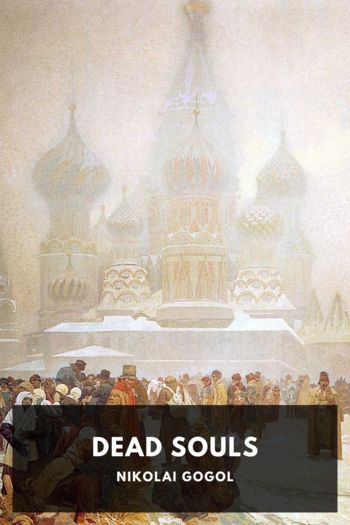Short Fiction - Nikolai Gogol (best selling autobiographies TXT) 📗

- Author: Nikolai Gogol
Book online «Short Fiction - Nikolai Gogol (best selling autobiographies TXT) 📗». Author Nikolai Gogol
Tchertokoutski always wore a coat of a military cut, spurs and moustache, in order not to have it supposed that he had served in the infantry, a branch of the service upon which he lavished the most contemptuous expressions. He frequented the numerous fairs to which flock the whole of the population of Southern Russia, consisting of nursemaids, tall girls, and burly gentlemen who go there in vehicles of such strange aspect that no one has ever seen their match even in a dream. He instinctively guessed the spot in which a regiment of cavalry was to be found and never failed to introduce himself to the officers. On perceiving them he bounded gracefully from his light phaeton and soon made acquaintance with them. At the last election he had given to the whole of the nobility a grand dinner during which he declared that if he were elected marshal he would put all gentlemen on the best possible footing. He usually behaved after the fashion of a great noble. He had married a rather pretty lady with a dowry of two hundred serfs and some thousands of rubles. This money was at once employed in the purchase of six fine horses, some gilt bronze locks, and a tame monkey. He further engaged a French cook. The two hundred peasants of the lady, as well as two hundred more belonging to the gentleman, were mortgaged to the bank. In a word, he was a regular nobleman. Besides himself, several other gentlemen were amongst the general’s guests, but it is not worth while speaking of them. The officers of the regiment, amongst whom were the colonel and the fat major, formed the majority of those present. The general himself was rather stout; a good officer, nevertheless, according to his subordinates. He had a rather deep bass voice.
The dinner was magnificent; there were sturgeons, sterlets, bustards, asparagus, quail, partridges, mushrooms. The flavour of all these dishes supplied an irrefutable proof of the sobriety of the cook during the twenty-four hours preceding the dinner. Four soldiers, who had been given him as assistants, had not ceased working all night, knife in hand, at the composition of ragouts and jellies. The immense quantity of long-necked bottles, mingled with shorter ones, holding claret and madeira; the fine summer day, the wide-open windows, the plates piled up with ice on the table, the crumpled shirtfronts of the gentlemen in plain clothes, and a brisk and noisy conversation, now dominated by the general’s voice, and now besprinkled with champagne, were all in perfect harmony. The guests rose from the table with a pleasant feeling of repletion, and, after having lit their pipes, all stepped out, coffee-cups in hand, on to the verandah.
“We can see her now,” said the general. “Here, my dear fellow,” added he, addressing his aide-de-camp, an active well-made young officer, “have the bay mare brought here. You shall see for yourselves, gentlemen.”
At these words the general took a long pull at his pipe.
“She is not quite recovered yet; there is not a decent stable in this cursed little place. But she is not bad looking—” puff—puff, the general here let out the smoke which he had kept in his mouth till then—“the little mare.”
“It is long since your excellency—” puff—puff—puff—“condescended to buy her?” asked Tchertokoutski.
Puff—puff—puff—puff. “Not very long, I had her from the breeding establishment two years ago.”
“And did your excellency condescend to take her ready broken, or to have her broken in here yourself?”
Puff—puff—puff—puff. “Here.”
As he spoke the general disappeared behind a cloud of smoke.
At that moment a soldier jumped out of the stable. The trampling of a horse’s hoofs was heard, and another soldier with immense moustaches, and wearing a long white tunic, appeared, leading by the bridle the terrified and quivering mare, which, suddenly rearing, lifted him off his feet.
“Come, come, Agrafena Ivanovna,” said he, leading her towards the verandah.
The mare’s name was Agrafena Ivanovna. Strong and bold as a Southern beauty, she suddenly became motionless.
The general began to look at her with evident satisfaction, and left off smoking. The colonel himself went down the steps and patted her neck. The major ran his hand down her legs, and all the other officers clicked their tongues at her.
Tchertokoutski left the verandah to take up a position beside the mare. The soldier who held her bridle drew himself up and stared fixedly at the guests.
“She is very fine, very fine,” said Tchertokoutski, “a very well-shaped beast. Will your excellency allow me to ask whether she is a good goer?”
“She goes well, but that idiot of a doctor, deuce take him, has given her some balls which have made her sneeze for the last two days.”
“She is a fine beast, a very fine beast. Has your excellency a turnout to match the horse?”
“Turnout! but she’s a saddle horse.”
“I know. I put the question, your excellency, to know if you have an equipage worthy of your other horses?”
“No, I have not much in the way of equipages; I must admit that, for some time past, I have been wanting to buy a calash, such as they build nowadays. I have written about it to my brother who is now at St. Petersburg, but I do not know whether he will be able to send me one.”
“It seems to me, your excellency,” remarked the colonel, “that there are no better calashes than those of Vienna.”
“You are right.” Puff—puff—puff.
“I have an excellent calash, your excellency, a real Viennese calash,” said Tchertokoutski.
“That in which you came?”
“Oh no, I make use of that for ordinary service, but the other is something extraordinary. It





Comments (0)